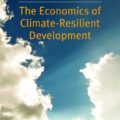Consumption-based carbon accounting: does it have a future?
Internationally, allocation of responsibility for reducing greenhouse gas emissions is currently based on the production-based (PB) accounting method, which measures emissions generated in the place where goods and services are produced. However, the growth of emissions embodied in trade has raised the question whether we should switch to, or amalgamate PB accounting, with other accounting […]



